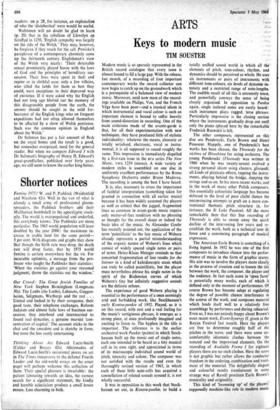Shorter notices
Famine 1975! W. and p. Paddock (Weidenfeld and Nicolson 42s). Well in the van of what is already a small army of professional gloom- spreaders, the Paddock brothers add their Malthusian bombshell to the apocalyptic stock- pile. The world is overpopulated, and underfed, this everybody knows. The Paddocks are more particular. The 1965 world population will have doubled by the year 2000: the maximum in- crease in arable land for the same period- 5 per cent. With diagrams and graphs they show that though the birth rate may drop, the death rate will drop faster, that by 1975 world famine is certain everywhere bar the us. For incurable optimists, a message from the pro- fessor who taught the Paddocks their statistics: 'When the statistics go against your reasoned judgment, throw the statistics out the window.'
Our Crowd: The Great Jewish Families of New York Stephen Birmingham (Longmans 50s). The Loebs (the Loebs), Lehmans, Guggen- heims, Seligmans, Warburgs and the rest . . . United and locked in by their arrogance, their good taste, their telephone exchanges, Reform Judaism and almost Salic laws of business suc- cession, they interbred and intermarried to found real dynasties, a genuine marxist 'con- centration of capital.' The account sticks to the chat and the anecdote and is sketchy in form, but none the less vastly entertaining.
Thinking About Art Edward Lucie-Smith (Calder and Boyars 42s). Aficionados of Edward Lucie-Smith's occasional pieces on art in The Times (successors to the defunct Fourth Leader and the old-world essays on the court page) will perhaps welcome this collection of them. Their special pleasure is invariable: the patient labouring towards an idea, the earnest search for a significant statement, the kindly and humble eclecticism produce a small house mouse. Less charming in bulk.






































 Previous page
Previous page